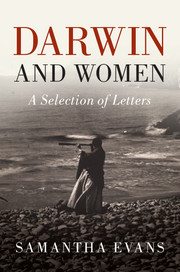Book contents
- Frontmatter
- Contents
- List of illustrations
- Foreword
- Preface
- Acknowledgments
- Symbols, abbreviations, and conventions
- 1 Friends
- 2 Marriage
- 3 Children
- 4 Scientific wives and allies
- 5 Observing plants
- 6 Companion animals
- 7 Insects and angels
- 8 Observing humans
- 9 Editors
- 10 Writers and critics
- 11 Religion
- 12 Travellers
- 13 Servants and governesses
- 14 Ascent of woman
- List of letters and provenances
- Biographical notes
- Bibliography and further reading
- Index
5 - Observing plants
Published online by Cambridge University Press: 16 February 2017
- Frontmatter
- Contents
- List of illustrations
- Foreword
- Preface
- Acknowledgments
- Symbols, abbreviations, and conventions
- 1 Friends
- 2 Marriage
- 3 Children
- 4 Scientific wives and allies
- 5 Observing plants
- 6 Companion animals
- 7 Insects and angels
- 8 Observing humans
- 9 Editors
- 10 Writers and critics
- 11 Religion
- 12 Travellers
- 13 Servants and governesses
- 14 Ascent of woman
- List of letters and provenances
- Biographical notes
- Bibliography and further reading
- Index
Summary
Botany was a popular subject for women in the nineteenth century. The materials were readily accessible for home study, and it was thought to be a good way of encouraging women to go outside and get some exercise and fresh air. It was, furthermore, an important subject; medical students studied botany as an essential part of their syllabus (materia medica, the raw material of medicines), and the increasing importance of empire, together with new experimental approaches such as Darwin's, rendered it cutting-edge. Of more than six hundred letters exchanged by Darwin and female correspondents, the largest number, after letters about family matters, are about botany. These range all the way from observations carried out on his behalf by nieces, to exchanges with other specialist botanists. This chapter only has room for a fraction of the letters available, and concentrates on four correspondents: Dorothy Nevill, Lydia Becker, Mary Treat, and Sophie Bledsoe Herrick.
Lady Dorothy Nevill had a notable garden at Dangstein near Midhurst, Sussex. She specialised in the cultivation of orchids, pitcher-plants, and other tropical plants. Her head gardener was James Vair, and since in her letters and autobiography she always minimises her own knowledge and accomplishments, it is difficult to assess how expert she was herself. Joseph Hooker wrote, ‘She was not the frivolous character she paints. She was thoroughly interested in the rare plants of her noble garden’ (Nevill 1919, p. 66). She was a tireless correspondent, supplied Darwin with many plants, and read his books. Darwin first wrote to her in 1861.
Down. | Bromley. | Kent. S.E.
Nov. 12th
Madam
Dr. Lindley has told me that he thought that your Ladyship would be willing, if in your power, to assist me.— I am preparing for publication a small work “on the various contrivances by which Orchids are fertilised.” I much wish to examine a few more exotic forms, & if you happen to have those which I wish to see, possibly your Ladyship would be so generous as to send me two or three flowers. I am aware that it would be a remote chance that your Ladyship should possess or spare these flowers. I chiefly want any member of the great Tribe of Arethusea, which includes the Limodorida, Vanillida &c.
- Type
- Chapter
- Information
- Darwin and WomenA Selection of Letters, pp. 67 - 89Publisher: Cambridge University PressPrint publication year: 2017



